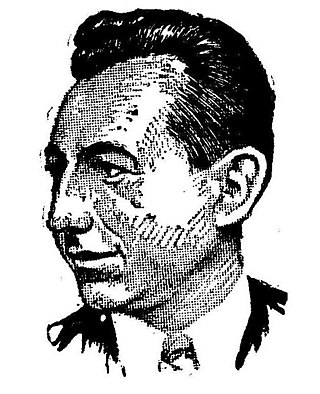
Nathaniel Schachner, who published under the names Nat Schachner and Nathan Schachner, was an American writer, historian, and attorney, as well as an early advocate of the development of rockets for space travel. A prominent author of historical works on figures from America's Revolutionary Era, Schachner also was a regular contributor to the genre leading up to and during the early years of what came to be referred to as the Golden Age of Science Fiction.

Unknown was an American pulp fantasy fiction magazine, published from 1939 to 1943 by Street & Smith, and edited by John W. Campbell. Unknown was a companion to Street & Smith's science fiction pulp, Astounding Science Fiction, which was also edited by Campbell at the time; many authors and illustrators contributed to both magazines. The leading fantasy magazine in the 1930s was Weird Tales, which focused on shock and horror. Campbell wanted to publish a fantasy magazine with more finesse and humor than Weird Tales, and put his plans into action when Eric Frank Russell sent him the manuscript of his novel Sinister Barrier, about aliens who own the human race. Unknown's first issue appeared in March 1939; in addition to Sinister Barrier, it included H. L. Gold's "Trouble With Water", a humorous fantasy about a New Yorker who meets a water gnome. Gold's story was the first of many in Unknown to combine commonplace reality with the fantastic.
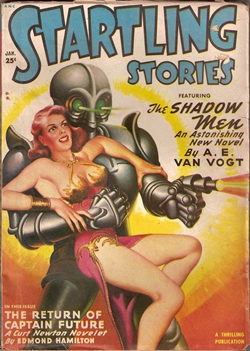
Startling Stories was an American pulp science fiction magazine, published from 1939 to 1955 by publisher Ned Pines' Standard Magazines. It was initially edited by Mort Weisinger, who was also the editor of Thrilling Wonder Stories, Standard's other science fiction title. Startling ran a lead novel in every issue; the first was The Black Flame by Stanley G. Weinbaum. When Standard Magazines acquired Thrilling Wonder in 1936, it also gained the rights to stories published in that magazine's predecessor, Wonder Stories, and selections from this early material were reprinted in Startling as "Hall of Fame" stories. Under Weisinger the magazine focused on younger readers and, when Weisinger was replaced by Oscar J. Friend in 1941, the magazine became even more juvenile in focus, with clichéd cover art and letters answered by a "Sergeant Saturn". Friend was replaced by Sam Merwin Jr. in 1945, and Merwin was able to improve the quality of the fiction substantially, publishing Arthur C. Clarke's Against the Fall of Night, and several other well-received stories.

Wonder Stories was an early American science fiction magazine which was published under several titles from 1929 to 1955. It was founded by Hugo Gernsback in 1929 after he had lost control of his first science fiction magazine, Amazing Stories, when his media company Experimenter Publishing went bankrupt. Within a few months of the bankruptcy, Gernsback launched three new magazines: Air Wonder Stories, Science Wonder Stories, and Science Wonder Quarterly.
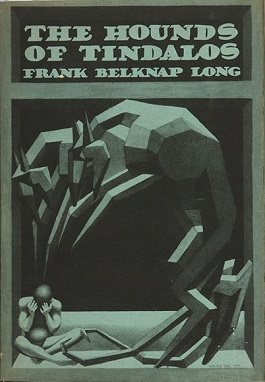
The Hounds of Tindalos is a collection of fantasy, horror and science fiction short stories by American writer Frank Belknap Long. It was released in 1946 and was the author's third book. It was published by Arkham House in an edition of 2,602 copies with cover art by Hannes Bok. A British hardcover was issued by Museum Press in 1950. Belmont Books reprinted The Hounds of Tindalos in two paperback volumes, The Hounds of Tindalos (1963) and The Dark Beasts (1964), omitting three stories; Panther Books issued a complete two-volume British paperback edition as The Hounds of Tindalos (1975) and The Black Druid (1975).

Beyond Time and Space is an anthology of science fiction stories edited by American writer August Derleth. It was first published by Pellegrini & Cudahy in 1950. Several of the stories had originally appeared in the magazines The Century, The Atlantic Monthly, The Strand, Blue Book, Blackwood's Magazine, Weird Tales, Amazing Stories, Astounding Stories, Maclean's, The American Legion Magazine and Startling Stories. A heavily abridged paperback edition was issued by Berkley Books in 1958.

The Outer Reaches is an anthology of science fiction stories edited by August Derleth. It was first published by Pellegrini & Cudahy in 1951. The stories had originally appeared in the magazines Fantasy & Science Fiction, Astounding Stories, Blue Book, Maclean's, Worlds Beyond, Amazing Stories, Fantastic Adventures, Thrilling Wonder Stories and Galaxy Science Fiction or in the anthology Invasion from Mars.

The Other Side of the Moon is an anthology of science fiction stories edited by American writer August Derleth. It was first published by Pellegrini & Cudahy in 1949. Many of the stories had originally appeared in the magazines The Graphic Christmas, Astounding Stories, Thrilling Wonder Stories, Wonder Stories, Weird Tales, Blue Book, Planet Stories, The Saturday Evening Post, Collier's Weekly or in the collections The Fourth Book of Jorkens by Lord Dunsany and The Witchfinder by S. Fowler Wright.
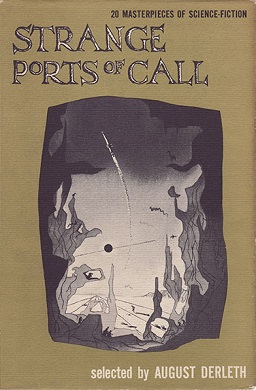
Strange Ports of Call is an anthology of science fiction stories edited by American writer August Derleth. It was first published by Pellegrini & Cudahy in 1948. The stories had originally appeared in the magazines Blue Book, Amazing Stories, Weird Tales, Science and Invention, Astounding Stories, Coronet, The New Review, The Black Cat, Thrilling Wonder Stories, Wonder Stories, Comet, The Saturday Evening Post, Collier's Weekly and Planet Stories.
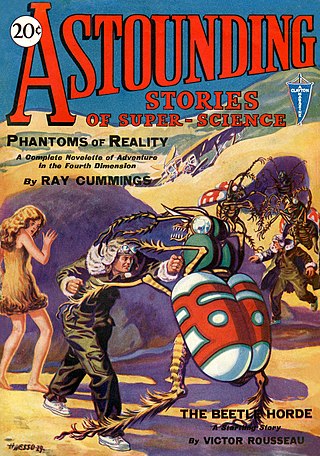
Analog Science Fiction and Fact is an American science fiction magazine published under various titles since 1930. Originally titled Astounding Stories of Super-Science, the first issue was dated January 1930, published by William Clayton, and edited by Harry Bates. Clayton went bankrupt in 1933 and the magazine was sold to Street & Smith. The new editor was F. Orlin Tremaine, who soon made Astounding the leading magazine in the nascent pulp science fiction field, publishing well-regarded stories such as Jack Williamson's Legion of Space and John W. Campbell's "Twilight". At the end of 1937, Campbell took over editorial duties under Tremaine's supervision, and the following year Tremaine was let go, giving Campbell more independence. Over the next few years Campbell published many stories that became classics in the field, including Isaac Asimov's Foundation series, A. E. van Vogt's Slan, and several novels and stories by Robert A. Heinlein. The period beginning with Campbell's editorship is often referred to as the Golden Age of Science Fiction.

Ahead of Time is a collection of science fiction stories by the American writer Henry Kuttner, first published in hardcover by Ballantine Books in 1953, with a paperback edition shortly afterwards. A British hardcover appeared in 1954, with a paperback following in 1961. Paperback reissues of both the UK and US editions appeared in the mid-1960s. A French translation appeared in 1962 and an Italian translation in 1971.
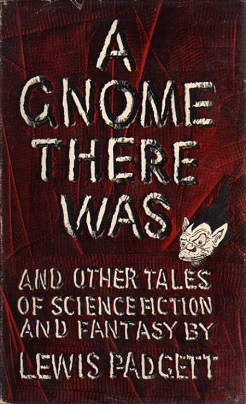
A Gnome There Was is a collection of science fiction and fantasy stories by American writers Henry Kuttner and C. L. Moore, published under their Lewis Padgett pseudonym by Simon & Schuster in 1950. No other editions were issued.

Children of Wonder is an anthology of science fiction and fantasy stories edited by William Tenn, published in hardcover by Simon & Schuster in 1953. It was reprinted in paperback in 1954 by Permabooks, under the title Outsiders: Children of Wonder. The only anthology edited by Tenn, its stories feature children with superhuman or supernatural talents.

Science-Fiction Adventures in Dimension is an anthology of science fiction stories edited by Groff Conklin, first published by Vanguard Press in hardcover in 1953. An abridged edition was issued by Grayson & Grayson in the UK, and an abridged paperback edition, with a different selection of stories from the original, was issued by Berkley Books; both abridgments carried unhyphenated titles.

Science Fiction Adventures in Mutation is a theme anthology of science fiction stories edited by American anthologist Groff Conklin, published in hardcover by Vanguard Press in 1955. An abridged paperback edition was issued by Berkley Books in 1965.

Strange Stories was a pulp magazine which ran for thirteen issues from 1939 to 1941. It was edited by Mort Weisinger, who was not credited. Contributors included Robert Bloch, Eric Frank Russell, C. L. Moore, August Derleth, and Henry Kuttner. Strange Stories was a competitor to the established leader in weird fiction, Weird Tales. With the launch, also in 1939, of the well-received Unknown, Strange Stories was unable to compete. It ceased publication in 1941 when Weisinger left to edit Superman comic books.
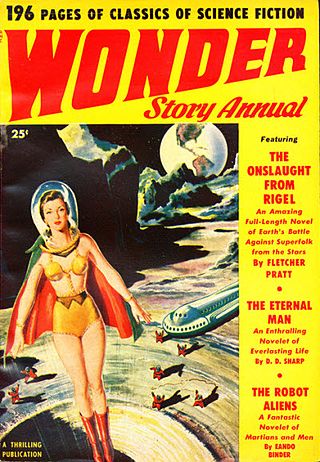
Wonder Story Annual was a science fiction pulp magazine which was launched in 1950 by Standard Magazines. It was created as a vehicle to reprint stories from early issues of Wonder Stories, Startling Stories, and Wonder Stories Quarterly, which were owned by the same publisher. It lasted for four issues, succumbing in 1953 to competition from the growing market for paperback science fiction. Reprinted stories included Twice in Time, by Manly Wade Wellman, and "The Brain-Stealers of Mars", by John W. Campbell.

Science-fiction and fantasy magazines began to be published in the United States in the 1920s. Stories with science-fiction themes had been appearing for decades in pulp magazines such as Argosy, but there were no magazines that specialized in a single genre until 1915, when Street & Smith, one of the major pulp publishers, brought out Detective Story Magazine. The first magazine to focus solely on fantasy and horror was Weird Tales, which was launched in 1923, and established itself as the leading weird fiction magazine over the next two decades; writers such as H.P. Lovecraft, Clark Ashton Smith and Robert E. Howard became regular contributors. In 1926 Weird Tales was joined by Amazing Stories, published by Hugo Gernsback; Amazing printed only science fiction, and no fantasy. Gernsback included a letter column in Amazing Stories, and this led to the creation of organized science-fiction fandom, as fans contacted each other using the addresses published with the letters. Gernsback wanted the fiction he printed to be scientifically accurate, and educational, as well as entertaining, but found it difficult to obtain stories that met his goals; he printed "The Moon Pool" by Abraham Merritt in 1927, despite it being completely unscientific. Gernsback lost control of Amazing Stories in 1929, but quickly started several new magazines. Wonder Stories, one of Gernsback's titles, was edited by David Lasser, who worked to improve the quality of the fiction he received. Another early competitor was Astounding Stories of Super-Science, which appeared in 1930, edited by Harry Bates, but Bates printed only the most basic adventure stories with minimal scientific content, and little of the material from his era is now remembered.

The Best of Edmond Hamilton is a collection of science fiction short stories by American author Edmond Hamilton, edited by his wife and fellow science fiction writer Leigh Brackett. It was first published in hardback by Nelson Doubleday in April 1977 and in paperback by Ballantine Books in August of the same year as a volume in its Classic Library of Science Fiction. The book was reissued in trade paperback and ebook editions by Phoenix Pick in November 2010. It has also been translated into German.

The Best of Henry Kuttner is a collection of science fiction and fantasy short stories by American author Henry Kuttner. It was first published in hardback by Nelson Doubleday in February 1975 and in paperback by Ballantine Books in April of the same year as a volume in its Classic Library of Science Fiction. The book was reissued in trade paperback by Del Rey/Ballantine in March 2007 under the alternate title The Last Mimzy: Stories. and in ebook by Gateway/Orion in May 2014 and Diversion Books in August 2014. It was later gathered together with Fury and Mutant into the omnibus collection Fury / Mutant / The Best of Henry Kuttner, issued in trade paperback and ebook by Gollancz in December 2013. It has also been translated into Spanish.




















